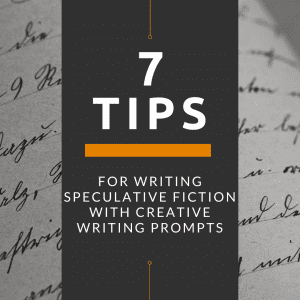7 Tips for Writing Speculative Fiction with Creative Writing Prompts
 7 Tips for Writing Speculative Fiction with Creative Writing Prompts
7 Tips for Writing Speculative Fiction with Creative Writing Prompts
By: Justin Osborne
Writing speculative fiction can be challenging, since events do not take place in the real world. Speculative fiction is sometimes called a “what-if” scenario, since the writer proposes a course of action and then speculates the outcome based on her own assessments of the story.
This type of creative writing changes the laws of possible and impossible and breaks down the barrier between them. The action that takes place in a brand-new, separate universe can be inspired by events that happened in real life – and most of the time, it is. However, random speculations give the writer a broader storyline and the ability to create an imaginative plot and uncanny characters. Here are seven of the most important tips for creating speculative writing fiction with creative writing prompts.
- Get inspired by real-life events
Most popular fictional books are based on real-life events, as Margaret Atwood so clearly emphasizes in one of her recent interviews. If you’re ready to enter the unknown fictional world by taking elements from reality, you should pay attention to these next ideas.
First, truth is essential in fiction. Write down statements that you truly believe in. Look around, observe. When looking at society, what is the bigger picture, the untold story? What can you notice and how many people would agree with your vision? If you reckon that’s more than 50%, it’s definitely an important idea.
Second, remember that “fake facts” look fake even in fiction. No matter how much you’re trying to sell a story, it won’t work unless you’ve got arguments to support your claims (yes, even inside your plot).
In a nutshell, think about truth and how you define it, find truthful statements that stick, and make sure your story facts are based in a defined reality.
- Strengthen the cause-and-effect strategy
Your narrative must flow from start to finish, so make sure that your cause-and-effect strategy is powerful. Great stories are written by developing a sustainable cause and effect chain that gives meaning to your action. If an action does not have a precedent (or a cause), it might be difficult to explain to the reader, or it might not make sense at all within the storyline. This is when your reader will start getting bored.
To avoid that, develop an outline. This will help you remember who does what and when, and how one character’s actions affect another one’s. Figure out how your character changes from start to finish and know how the action develops. You should create an interlocking sequence of events to ensure that your cause-and-effect strategy sticks.
- Know who’s winning and who’s losing
Be aware of your villains and heroes before writing the action. Your protagonist should be the hero(ine) of your story, the one whose life is most closely followed. The antagonist is your anti-hero, the one that makes things unfold poorly.
Speculative fiction is sensible to both of these characters; that being said, you’ve got to define them well before writing your plot. From whom does the utopian, fictional reality evolve? Who’s the one creating the supernatural world? Who are the winner and the loser of your show? If you’re having doubts, you can always consult with the best essay writing service for more ideas on how to organize and define your characters.
- Research well
Since your storyline is based in real events, research is of high importance. As I mentioned before, your facts must be clearly stated, and your world clearly defined. If your universe is not clearly defined, you might have to come back to the beginning and change the whole story, argues Gina, copyright specialist. This is why you’ve also got to make specific rules for your universe. How does your world look like and why? Who provoked that? What are its boundaries? Know the limit between fiction and reality before starting.
- Your visual language must be appealing to the reader
Speculative fiction requires serious character definition. The only way to clearly define a character is by using visual language (to describe its traits, clothes, appearance, emotions, thoughts, actions). This is essential, as it will be the center of your work. The more creative your language, the better your characters. Here it’s a good place to start thinking about symbolism. Start introducing small symbolic details into your description to define each one of your “cast members.”
- Create rules and stick to them
Your story will not be plausible unless you respect your own rules. I mentioned this in point four, where I explained why setting boundaries and mapping out a plan is necessary. Your action will only be credible if you make it so.
- Read speculative fiction books for inspiration
Last but not least, reading speculative fiction might open your mind doors and help you see more clearly into this world. This is why you should check out Aldous Huxley’s Brave New World (1932), H.G. Wells’s War of the Worlds (1897), or Orwell’s 1984 (1942).
About the Author:
Justin is a marketing specialist and essay writer from Leicester, UK. When not working and rooting for Leicester FC, he likes to discuss new trends in digital marketing and share his own ideas with readers on different blogs and forums. Currently, he is working as a content marketer at best essay writing service.
- About the Author
- Latest Posts
The Horror Tree is a resource for horror authors which was created in 2011. The main goal when starting the site was to include all of the latest horror anthologies and publishers that are taking paying submissions. A resource useful for both new and experienced publishers alike looking for an outlet for their written material!












